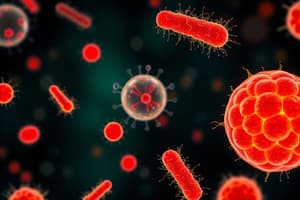Podcast
Questions and Answers
¿Cuál es el objetivo principal de la microbiología ambiental?
¿Cuál es el objetivo principal de la microbiología ambiental?
- Analizar los microorganismos en el ámbito farmacéutico
- Desarrollar microorganismos para aplicaciones tecnológicas
- Estudiar los microorganismos en la industria alimentaria
- Investigar los microorganismos en el suelo, agua y aire (correct)
¿Cuál es una aplicación importante de la microbiología industrial?
¿Cuál es una aplicación importante de la microbiología industrial?
- Estudio de microorganismos en mamíferos marinos
- Producción de biofármacos (correct)
- Desarrollo de microorganismos para aplicaciones espaciales
- Investigación de microorganismos en la atmósfera
¿Qué papel desempeñan los microorganismos en la seguridad alimentaria según el texto?
¿Qué papel desempeñan los microorganismos en la seguridad alimentaria según el texto?
- Aumentar la vida útil de los alimentos
- Promover el crecimiento de plantas
- Identificar posibles contaminantes y enfermedades transmitidas por alimentos (correct)
- Reducir el impacto ambiental de la agricultura
¿Qué función cumplen los microorganismos beneficiosos en la agricultura según el texto?
¿Qué función cumplen los microorganismos beneficiosos en la agricultura según el texto?
¿Cuál es uno de los sectores impactados por la microbiología industrial según el texto?
¿Cuál es uno de los sectores impactados por la microbiología industrial según el texto?
¿Qué implica la monitorización microbiana en productos alimenticios según lo descrito?
¿Qué implica la monitorización microbiana en productos alimenticios según lo descrito?
¿En qué se enfoca la microbiología alimentaria?
¿En qué se enfoca la microbiología alimentaria?
¿Cuál es uno de los productos que los microorganismos pueden producir a través de la fermentación?
¿Cuál es uno de los productos que los microorganismos pueden producir a través de la fermentación?
¿Por qué es importante la microbiología farmacéutica en la producción de medicamentos?
¿Por qué es importante la microbiología farmacéutica en la producción de medicamentos?
¿Qué se entiende por microbiología aplicada?
¿Qué se entiende por microbiología aplicada?
¿Qué papel juegan los microorganismos en la producción farmacéutica?
¿Qué papel juegan los microorganismos en la producción farmacéutica?
¿Cómo afectan los microorganismos a la seguridad alimentaria?
¿Cómo afectan los microorganismos a la seguridad alimentaria?
Flashcards are hidden until you start studying
Study Notes
Applied Microbiology: The Fascinating Intersection of Science and Industry
Applied microbiology is an interdisciplinary field that explores the practical applications of microbiology in various industries and fields. This encompasses the study of microorganisms, their interactions with the environment and other organisms, and the development of tools and technologies to harness these interactions for the benefit of humans and the environment.
Food Microbiology
A prominent application of applied microbiology is in the food industry. Food microbiology focuses on the study of microorganisms that affect food production and safety. This includes understanding the microorganisms responsible for food spoilage and foodborne illness, as well as the development of methods to prevent and control these organisms. For instance, microorganisms can produce foods through fermentation, such as yogurt, cheese, and bread. Conversely, they can also cause food spoilage and contamination, leading to foodborne illnesses.
Pharmaceutical Microbiology
Pharmaceutical microbiology is another area of applied microbiology. It focuses on the study of microorganisms involved in the production of pharmaceuticals, such as antibiotics, enzymes, vitamins, and vaccines. This field is essential in understanding the causes of pharmaceutical contamination and spoilage, and in developing methods to control and prevent these issues.
Environmental Microbiology
Environmental microbiology examines the role of microorganisms in the environment, including soil, water, and air. It involves the study of microbial ecology, geomicrobiology, and epidemiology. This field is crucial in understanding the dynamics of microbial communities and their impact on ecosystems, and in developing strategies to manage and maintain these ecosystems.
Industrial Microbiology
Industrial microbiology is concerned with the exploitation of microbes for industrial processes. This includes the study of microorganisms involved in industrial fermentation, wastewater treatment, and biotechnological applications. Industrial microbiology is closely linked to the biotechnology industry and has a significant impact on various sectors, such as agriculture, pharmaceuticals, and biotechnology.
Applied Microbiology in Phyllosphere
The phyllosphere, or the leaf surface, is a unique microbial environment that has attracted the attention of applied microbiologists. The phyllosphere is home to a diverse community of microorganisms, including bacteria, fungi, and viruses. These microorganisms play crucial roles in plant health and productivity, as well as in the production of various commercial products. Understanding the applied microbiology of the phyllosphere can lead to the development of new applications in agriculture, biotechnology, and other fields.
Applied Microbiology in Food Safety
Applied microbiology is also crucial in ensuring food safety. By monitoring microbial community profiles in food products, scientists can identify and predict potential contaminants and foodborne illnesses. This knowledge can be used to develop strategies for preventing and controlling these issues, thereby improving public health.
Applied Microbiology in Agriculture
In agriculture, applied microbiology is used to study microorganisms that affect crop health and productivity. This includes plant pathogens and beneficial microorganisms that can promote plant growth and protect against disease. By understanding these interactions, agricultural practices can be optimized to enhance crop yields and reduce the need for chemical inputs.
Applied Microbiology in Biotechnology
In biotechnology, applied microbiology is used to develop new products and technologies based on microbial processes. This includes the manipulation of microorganisms at the genetic and molecular level to produce useful products, such as enzymes, biofuels, and pharmaceuticals.
Applied Microbiology in Environmental Monitoring
Applied microbiology is also used in environmental monitoring to track the presence and activity of microorganisms in various ecosystems. This information can be used to understand the health of ecosystems, to predict and prevent the spread of diseases, and to develop strategies for managing and restoring ecosystems.
Applied Microbiology in Forensics
Lastly, applied microbiology plays a crucial role in forensic investigations. Microbial forensics uses microbiological knowledge and methods to provide evidence in unlawful matters, including the abuse of pathogenic organisms and their metabolites for social or economic damage. This field has become increasingly important with the growth of travel and trade, as it helps to maintain food security and protect public health.
In conclusion, applied microbiology is a vast and diverse field that continues to expand as new applications and technologies are developed. It plays a critical role in various industries, from food production and pharmaceuticals to agriculture and environmental management. As our understanding of microorganisms and their interactions with the environment continues to grow, so too will the potential applications of applied microbiology.
Studying That Suits You
Use AI to generate personalized quizzes and flashcards to suit your learning preferences.




